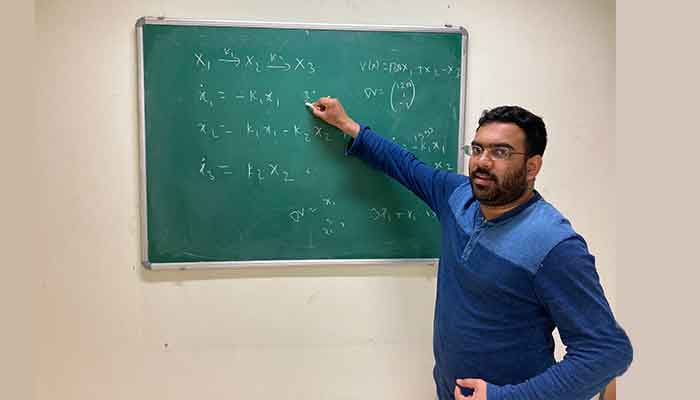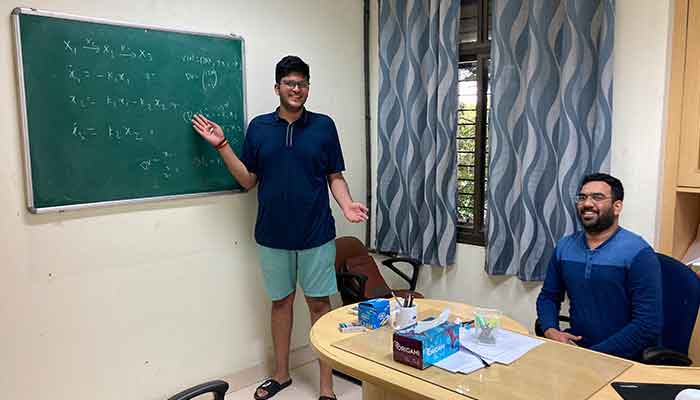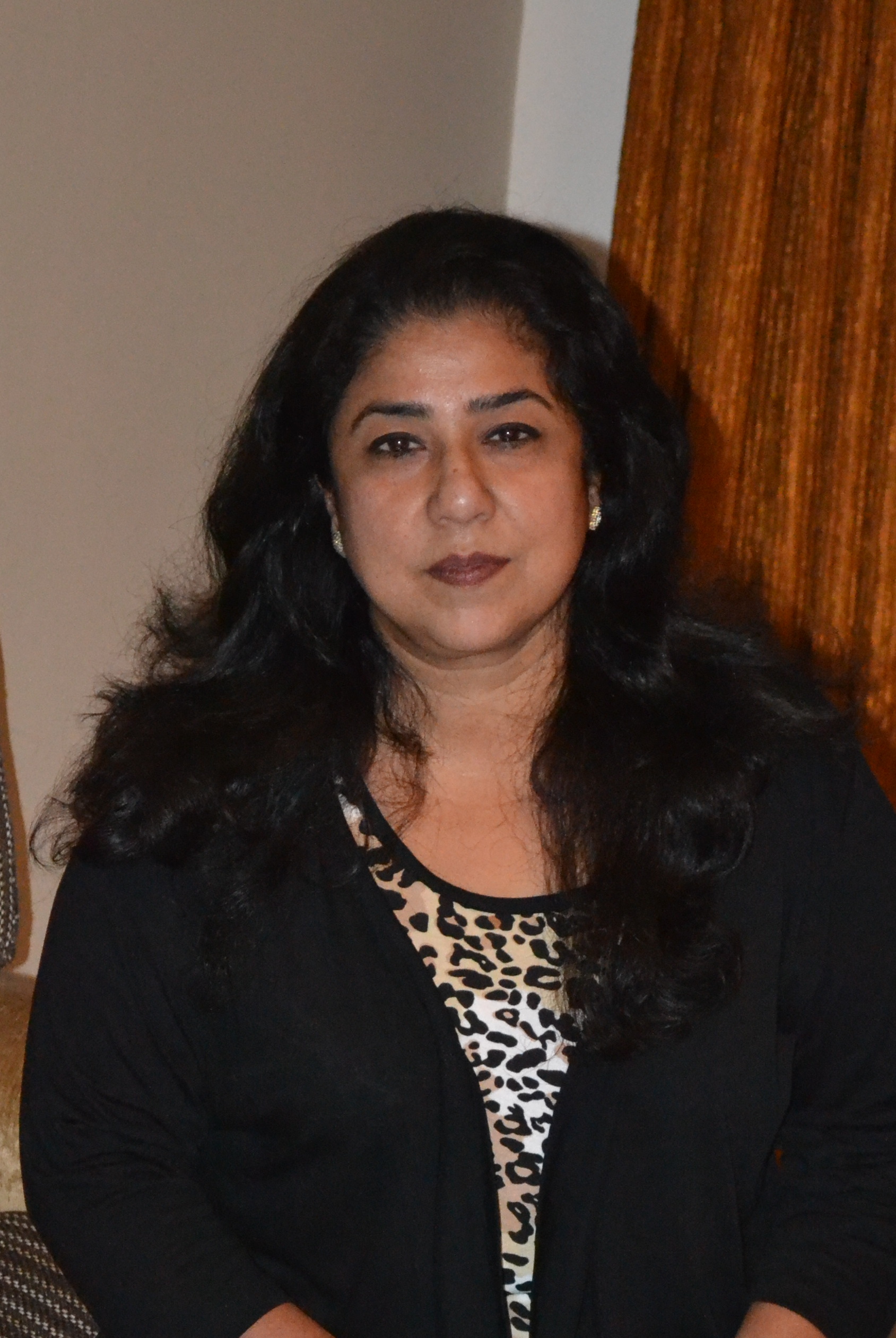Can an applied mathematician working with a blackboard and chalk at IIITH predict the dynamics of the Hooded Grebe in Argentinian Patagonia or the ring-tailed lemur in Madagascar or the Nilgiri Tahr in Himalayas against emerging diseases and minimize future outbreaks? Apparently, you can, with the study of dynamical systems!
A gold medalist from IIITH’s first batch of the CND program (B. Tech in Computer Science and Masters in Computational Natural Sciences (2009-14)), Abhishek Deshpande rejoined CCNSB as an Assistant Professor in 2021, after completing his PhD at Imperial College London and doing post-doctoral research at the University of Wisconsin-Madison.
“Most of my work hovers around using math, linear algebra, topology and differential equations and applying it to biological systems”, explains Abhishek. “For example, to understand the possibility of a certain species of ostrich going extinct, one studies their inherent network structure which encodes the interaction between species and make inference about their dynamics.” His work has profound applications in epidemiology, population dynamics and in modeling the spread of infectious diseases.
Research horizons
Dynamical systems are ubiquitous in nature. Your bathtub for instance is a dynamic system of water inflow and outflow, with the processes represented by the faucet and the drain that manage the water quantity inside the tub.
Though mathematical biology has been around for many decades, the field has received a lot of attention recently in the context of reaction network theory. In simple terms, reaction networks can be thought of as graphs embedded in Euclidean space. The idea is to analyze the geometry of reaction networks to make inference about its dynamics. The power of this analysis stems from the fact we do not have to deal with complicated non-linear differential equations; but rather focus on the graphical structure of the underlying network. One significant aspect of his research deals with the property of “persistence” (which means that no species can become extinct). More specifically, his research explores conditions on the graphical structure of the reaction network that guarantees this property of persistence. Recently, reaction networks have also found applications in machine learning, artificial intelligence and algebraic statistics. A recent project of his uses the dynamics generated by reaction networks to mimic neural networks.
Another facet of his research focuses on retroactivity and signal transduction in biological circuits, like enzymatic cascades. The idea is to analyze how modules behave when they are interconnected to each other. Each module has its own functionality and when they are interconnected, they effectively lose their functionality. This phenomenon is called retroactivity and is often used by electrical engineers in analyzing complicated circuits.
Yet another direction of his research relates to the design of “optimal bits”. A bit (possessing two states “0” and “1”) can be represented as a particle in a double-well potential. The idea is to design reliable bits that can be erased fast with minimal cost. The work involved using concepts from diverse fields like computer science, thermodynamics and statistical mechanics.

Fond memories on IIITH campus
Abhishek enjoys being back on IIIT Hyderabad’s verdant campus since “everything feels the same as it was 12 years ago, especially the Vindhya canteen and Kadamba Mess. I have more memories as a student than as a faculty”, he observes, recalling the late-night forays to DLF for samosas and bondas and the movies he enjoyed. “Those are things that will stay with me forever”, he smiles.
What Abhishek enjoyed most during his dual degree program at IIIT Hyderabad was that it offered a unique blend of mathematics, computer science and natural sciences courses. Along with programming and data structures, he got to study topics like statistical mechanics, quantum mechanics and molecular dynamics.
A KVPY scholarship awardee, Abhishek also featured on the Dean’s list for outstanding academic performance throughout his innings at IIITH. He credits his teachers – Prof. Harjinder Singh, Dr. Indranil Chakrabarty, Dr. Prabhakar, Prof. Deva Priyakumar, Prof. Abhijit Mitra and Prof. Tapan Sau as being big influences who were especially supportive of him during his IIITH days. He did his master’s thesis on problems related to quantum information and quantum control theory under the supervision of Prof. Harjinder Singh and Dr. Indranil Chakrabarty.
Internships that broadened his world view
Abhishek’s first international exposure was his undergraduate internship at the Fields Institute, Toronto at the tender age of 19, that would change his outlook. His internship at IISER-Kolkata piqued his curiosity in quantum algorithms. This was followed by internships at TIFR, where he explored the field of reaction networks.
Abhishek went on to complete his PhD from Imperial College London in Applied Mathematics (2014-18) on a ROTH scholarship. While at London, he took additional courses in Applied Probability, Inference, Control and Driving and Stochastic Processes. During his postdoctoral stint at Wisconsin-Madison, he took and taught several courses on linear algebra, analysis, and differential equations. The international exposure would go a long way in helping him to understand how to work in a group, reflects Abhishek who won the American Mathematical Society-Simon travel grant, during his postdoctoral stint.
Drawing inspiration from the Mozart of Mathematics
Abhishek grew up in Thane, Mumbai and studied at the prestigious Smt. Sulochanadevi Singhania School (1997-2009). It was the book ‘Solving mathematical problems- A personal perspective’ by Terence Tao that got him very excited, and he was “deeply influenced by how he thought about problems”, remarks Abhishek. Tao known as the Mozart of Mathematics is one of the greatest mathematicians today. “Even as a child, I was always interested in applied math, to understand and solve puzzles and using math to do interesting stuff”, he muses. His parents would encourage him to participate in competitions and take up research.

As an alumnus of the Institute, his advice to students is; “make good use of this opportunity of living in a hostel for four years. Study when you should but at the same time, enjoy hostel life and the time that you spend with your friends, because that is not coming back”. Recently, the SERB Startup Research Grant for his research was approved and will fuel his upcoming work in dynamical systems.



Next post